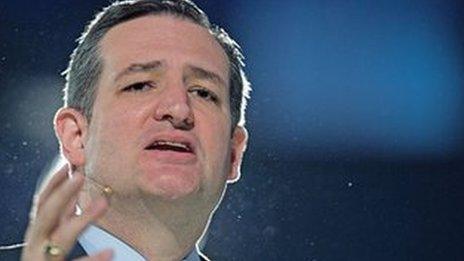Culture wars rage on for conservatives
- Published
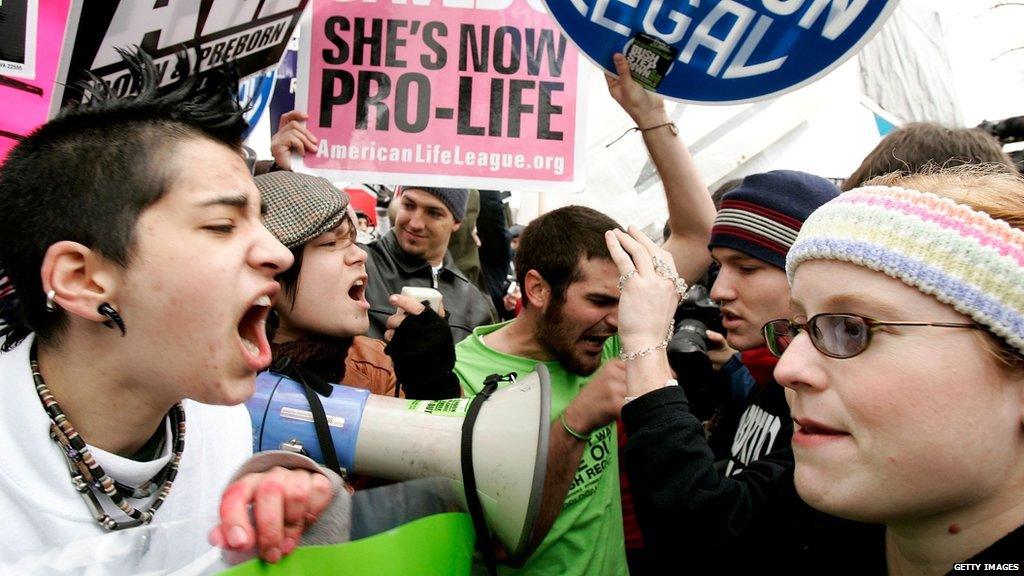
On the eve of what could be a landmark US Supreme Court decision enshrining gay marriage as a constitutional right across the country, evangelical conservatives converged on Washington DC to talk politics and size up Republican presidential hopefuls.
Just last year the epitaph was being written on the so-called culture wars in the US. Social conservatism appeared to be on the ropes, as the New York Times heralded, external the fact that Democratic candidates were no longer afraid of touting their support for issues like gay rights and birth control.
And while many of the Democrats ended up losing in a mid-term election rout, the religious activists who attended this week's Faith and Freedom Coalition event in the nation's capital still feel at risk - and not just because Friday's activities were interrupted, external by what DC police called a "credible" bomb threat.
"We are told that church and state must be kept separate," an online video, external promoting the conference intoned. "We are told that the younger generation doesn't care about politics. We are told that our conservative beliefs are outdated."
Even the name of the gathering, "Road to Majority", implies the additional work ahead for the religious right. And it's easy to see why evangelical conservatives, long a bulwark of the Republican Party, could be feeling defensive.

Not only does the Supreme Court appear poised to legalise gay marriage across the country, states that have attempted to pass "religious freedom" laws allowing businesses to refuse service to gays have faced angry protests and corporate boycotts. Caitlyn Jenner, the transgender Olympic athlete, received a Vanity Fair photo shoot and was widely praised in the media for her bravery.
"If you want one snapshot of just how corrupt, how morally corrupt, how morally bent, how morally twisted, how morally confused, how morally bankrupt we have become, all you've got to do is take a look at the cover of Vanity Fair magazine," said, external conservative syndicated radio host Bryan Fischer earlier this month.
There's a feeling among many of these religious foot soldiers that their views are largely being ignored by a hostile government and openly mocked by much of the establishment press. On the stump, most of the Republican presidential hopefuls seem more interested in talking about the Islamic State than the state of the social conservative movement.
Public professions of personal faith
For a handful of days, however, evangelicals were at the centre of the campaign for the Republican presidential nomination, as a dozen candidates appeared before the hundreds of attendees.
Some, like Texas Senator Ted Cruz and Louisiana Governor Bobby Jindal, made religious concerns a central part of their talks.
"This is a time when we decide who we are. What we believe," Mr Cruz said on Thursday. "We are a nation that was founded by men and women fleeing religious oppression. There is a reason why religious liberty is the very first protection in the very first amendment to the Bill of Rights, because it is all foundational. We cannot stand unless we first honour on our knees."
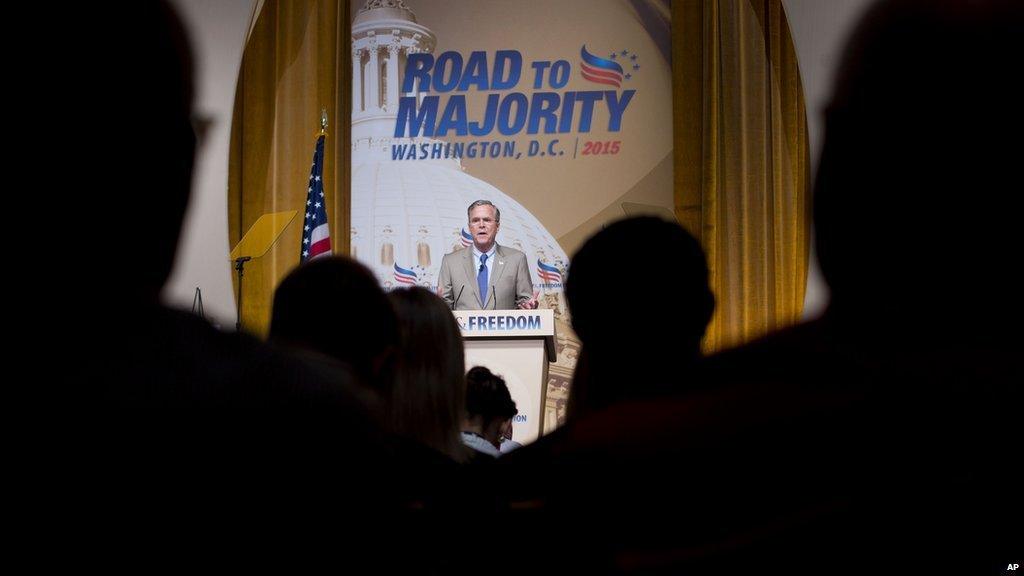
Jeb Bush tells the evangelical audience that faith is "part of my architecture"
Others, like former Florida Governor Jeb Bush and Ohio Governor John Kasich, spent most of their time sharing stories about their personal faith.
Religion, Mr Bush said, has "been an organising part of my architecture, if you will, as a person and as an elected official".
Yet others, including New Jersey Governor Chris Christie and Florida Senator Marco Rubio, barely seemed to acknowledge the specific concerns of the evangelical audience. They delivered a mostly standard stump speech, equally suited to an Iowa Chamber of Commerce meeting or a New Hampshire town hall.
Linda Thorson, who travelled from North Dakota to attend the conference, said that while she liked Mr Rubio, she had heard much of his speech before. She said she preferred Mr Cruz because he understands that the country "is going in the wrong direction".
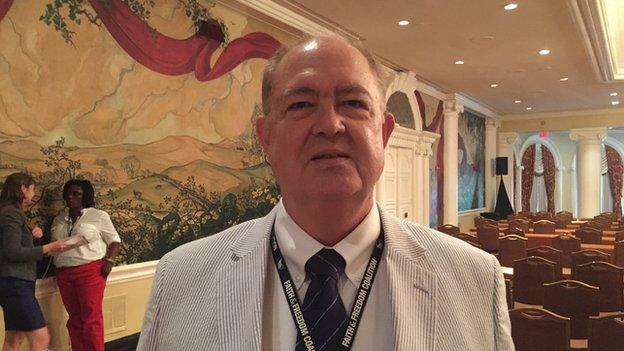
Michael Douds says conference attendees "don't have a beef with gay people"
"I appreciate knowing that there are leaders that see God's face first," she said. "One of the concerns I have is the way the media and others have looked at religious liberty and decided that that isn't something to defend."
Michal Douds of Pittsburgh, for one, wasn't buying what Mr Bush was selling.
"I think he's really crafty," he said. "I think he's really slick. I think he's got a lot of people working for him that give him words to say that seem very palatable to this group."
Douds added that efforts to paint the evangelical conservative movement as obsessed with gays and stories about Caitlyn Jenner were a "diversion tactic" by those on the left.
"I think most of the people here don't have a big beef with gay people - they have a live-and-let-live kind of culture," he said. "And at the same time they believe marriage is between a man and a woman, as it has been for 5,000 years."
Common animosity for Common Core
Another area of concern for conference-goers was education. When former New York Governor George Pataki spoke on Friday, his largest applause line was when he said he'd get rid of the uniform programme of curriculum standards called Common Core.
Paul Halley of New Jersey said Common Core is, in effect, a liberal religion being imposed on public schools.
"We need to return to Judeo-Christian values in schools because those are the only values that support a republic," he said. "By our next generation we will probably lose our republic because the children will be taught we can't trust in God, we must trust in government to take care of us."
The abortion exception
One tried-and-true culture war issue that didn't get a lot of mention this week, however, was abortion. And when it was discussed, it was cited as a success story - an indication that if the culture war is still ongoing, it's far from the series of one-sided victory for progressives that it is often made out to be.
Chris Christie received some of his loudest cheers when he mentioned, in passing, that he vetoed government funding in his state for the reproductive rights group Planned Parenthood.
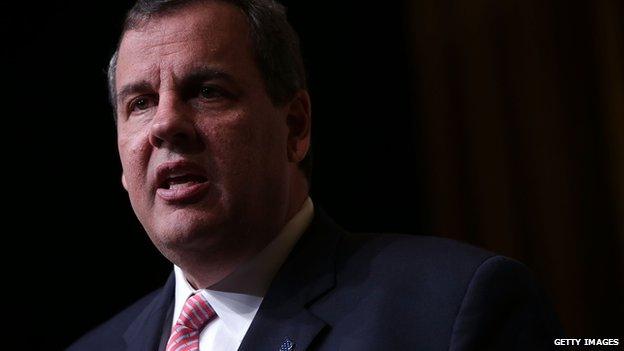
Chris Christie boasted of vetoing Planned Parenthood funding
Mr Bush touted his support for a Florida bill banning late-term abortions, more strictly regulating abortion clinics and requiring the parents of minors to be notified before they terminate a pregnancy.
"We put the rights of the unborn at the front of the line," he said. "We made sure there were reasonable health and safety standards to protect women."
Florida isn't alone in its pursuit of tighter restrictions on abortion. For instance, 15 states, including Texas, Georgia, Indiana and West Virginia, have bans on abortion after the 20th week of pregnancy.
The pope's environmental counterpoint
Walk the venues of the Faith and Freedom event this week, and it's easy to get the notion that the culture wars are still raging in the US - and that the lines of the battlefield can be sharply drawn, with religious activists on one side and secular liberals on the other. Outside hotel's ballrooms, however, and those lines become a bit more blurry.
On the same day that Mr Cruz and company were offering their dire warnings of cultural decay, Pope Francis issued a groundbreaking 184-page encyclical urging a "cultural revolution" of a different sort - to combat climate change and preserve the global environment.
In the halls outside the conference James Salt, founder of the group Catholics United, was handing out copies of a document explaining the Pope's message.
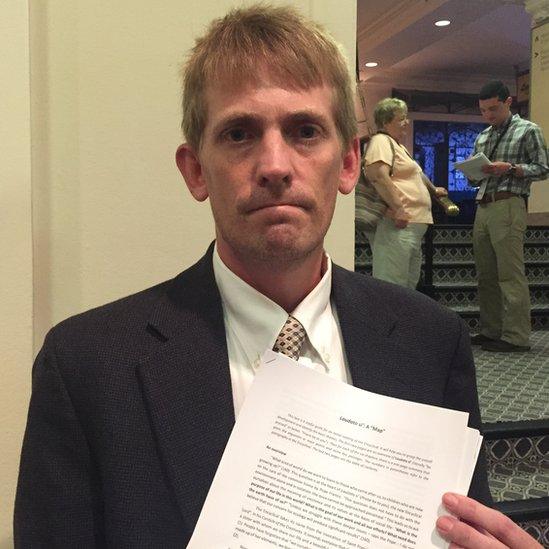
James Salt hands out information on the pope's environmental encyclical
"We're calling on their better nature to read the document and join us in taking a stand," he said. "To hold conference on the very same day that Pope Francis issues a groundbreaking encyclical on climate change and to dismiss that without statement on a day when your honouring faith and values in public life seems to make a mockery of religion."
None of the presidential candidates at the conference addressed the Pope's views while on the stage, but Mr Kasich was asked for his views during a press gathering after his speech.
"I think the Pope pointing out we need to take care of this environment is good," he said. "I don't agree with his conclusion that all of it is bad because of free enterprise, because it has lifted people out of poverty, and he cares about the poor."
Mr Kasich went on to talk about what his faith means to him, and how it guides how he makes public policy.
"What my faith does for me, I hope, is give me strength," he said. "It allows me to have patience, it helps me to love my enemies, it helps me to care more about other people, to be more empathetic to other people, that's what it's about to me."
It's not exactly war talk. But religion, whether it's on the right or the left, doesn't always have to be a battle.
Republicans in - and out - of the 2016 presidential race

- Published16 March 2016
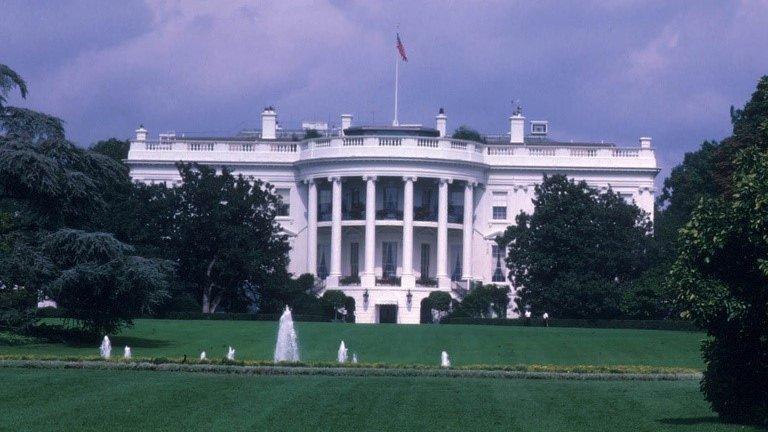
- Published23 March 2015
